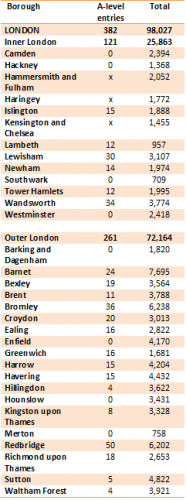Here are some shocking stats on our skills gap in need of a solid solution – despite being home to the most digitally innovative industries in the world and ‘Tech City’ London’s schools are currently failing to produce Computer Science students in enough numbers to fill the needs of universities, hi tech and creative businesses who have found their home here.
Department for Education statistics illustrate the poor take up of Computing and Computer Studies in the capital’s schools, with only 382 students deciding to take Computing/Computer Studies at A-level (out of over 98,000 A-levels entered).
I know it’s the Olympic Year but we might creating problems for ourselves if more students are applying (as they are now) to take PE than Computing at A-level.
The ‘digital corridor’ between Westminster (Soho)-Camden (King’s Cross)-Islington-Hackney, home to ‘Tech City’ and world-leading universities, advertising firms, visual effects, film, music and video games companies, straddles London boroughs in which there are currently only 15 students studying Computing A-level.
This is the same number as Southend.
The table below shows numbers of A-level entries in 2010/11, out of total A-level entries.
(‘x’ denotes data suppressed, less than 5).
From the country that created the BBC Micro in the 1980s we’ve got to ask ourselves: where did we go wrong and why are the figures so shockingly low?
A combination of factors are at play:
- At GCSE the ICT curriculum taught – focusing almost entirely on office skills – is a turn off to those who want to know how computer actually work.
- London schools currently lack enough qualified teachers to teach even the existing ICT courses, let alone a new Computer Science course. Only 29% of teachers are qualified to teach ICT today in inner London schools and 45% in outer London.
- There are also serious questions about whether current computing courses are rigorous or adaptable enough.
- The fragmented nature of London education means that each academy and each of the 32 boroughs will have a different approach – or no approach at all.
Both a cause and effect – there is also a massive gender divide – as with all ‘STEM subjects’ – nationally only 7% (241) of Computing A-level students are girls.
Being able to programme computers will be fundamental to the digital age, London won’t be a digital city for Londoners unless schools respond to this call and reform how they teach these crucial skills.
The DfE figures from across the country are also poor.
Our leading hi-tech firms currently source talent from overseas because of skills shortages at home. That is mainly a failing of our out-of-date education system – from schools through to universities – and it needs to be urgently tackled if we are to remain globally competitive.
Labour in Wales has allowed concerted action to be taken to create a strategy and an infrastructure to support change, with £3m announced in June to help teachers and schools skill up. London has no such strategy as education is fragmented across 32 London boroughs, and hundreds of new academies – schools which do not have to follow the National Curriculum.
From September 2012 the Department for Education will allow schools to move away from the traditional ‘Programme of Study’ for Information and Communication Technology, giving schools the ability to change what they teach and to innovate – one Gove reform actually welcomed across the board. This will allow curricula to be refreshed and make room for the fundamental principles of Computer Science to be taught in classrooms.
Where countries have innovated in this field, like Israel after 2000, they adopted a strategic approach because they saw programming and Computer Science as in the national interest.
A hi-tech skills strategy for London means more schools need to be taking up Computer Science at GCSE from September and support to train a new generation of Computer Science teachers.
We must also make sure that these skills are open to all, to help state maintained schools get kids from all backgrounds – and both sexes – into the jobs of the future.
It might seem counter-intuitive at a time when government reforms are decoupling schools and education authorities that councils should have a role in a new area of study – but local government, with its renewed focus on growth and economic innovation and its continuing links with educators and local firms, doesn’t have to be in search of a role to help get schools – and children – coding again.
Theo Blackwell is Cabinet member for Finance in Camden




More from LabourList
‘National flags and identity can be inclusive – we’re right to embrace them’
Revealed: Claims of bullying, misogyny and harassment in Young Fabians
‘Sunak’s claim of a ‘sick note culture’ is immoral and deeply flawed’